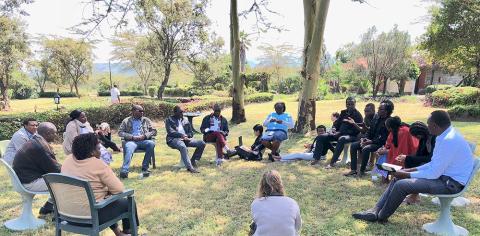Discover hidden stories and unheard voices on land governance issues from around the world. This is where the Land Portal community shares activities, experiences, challenges and successes.
 Follow our
Follow our
Sustainable Development Goals
Blog Series!
Interested in land corruption?
Follow our Land & Corruption Blog Series
for in-depth perspectives from the experts.
Issues
Geographical focus
In the last five years, significant steps have been taken to put land tenure security as a priority in global policy frameworks, but also in implementation plans. A side event at CFS45, organised by the Global Donor Working Group on Land with other key players, took stock of progress.
I had the privilege of representing the Land Portal Foundation at the FAO Expert consultation on “Knowledge sharing for agricultural innovations applicable for smallholders and family farmers in Europe and Central Asia”, which took place in Gödöllő (Hungary) from the 10-13 September 2018.
By Ayesha Audu
Land governance covers all activities associated with the management of land and natural resources that are required to fulfil political and social objectives.
Good and transparent land governance will serve a country's national resources management, the rights of its citizens, and lead to a reduction of poverty. In addition, sound land governance is crucial to achieving relevant sustainable development goals (SDGs).
The Sengwer are an indigenous hunter-gatherer people living along the slopes of the Cherangany Hills in the western highlands of Kenya. Their estimated population is 33,187.
Making the invisible visible within national data systems was an important area of discussion at the United Nations World Data Forum. Invisible population groups in data are commonly the most vulnerable populations — women and girls, people with disability, refugee and migrants, and the elderly.
Progress on women’s rights has been far slower than expected across the world as a report shows underage marriage rates have barely come down this decade, while dozens of nations still legally prioritise men.
Forty-one countries recognise only a man to be the head of the household; 27 countries still require that women obey their husbands by law; and 24 countries require women to have the permission of their husband or a legal guardian (such as a brother or father) in order to work.
We cannot restore tropical forests without restoring the rights of their traditional owners.
Implementing a coordinated global response to curb demand for energy and eliminate further deforestation would reduce the need to deploy artificial carbon dioxide removal technologies, according to a decisive report from the U.N. scientific panel on climate change.
WATER. The most basic necessity that most people take for granted because it is readily available by just a turn of the tap.
But for some groups in Malaysia, safe drinking water and sanitation is not accessible.
Thousands of farmers from across India will march to the parliament in New Delhi on November 30, to demand action on the deepening agrarian crisis that has left a trail of heavy debts and suicide in its wake.
Networks provide an increasingly popular organizational structure for collective action on land rights in Africa and elsewhere around the world, but sustaining networks’ impact, engagement, and resourcing can be challenging.












